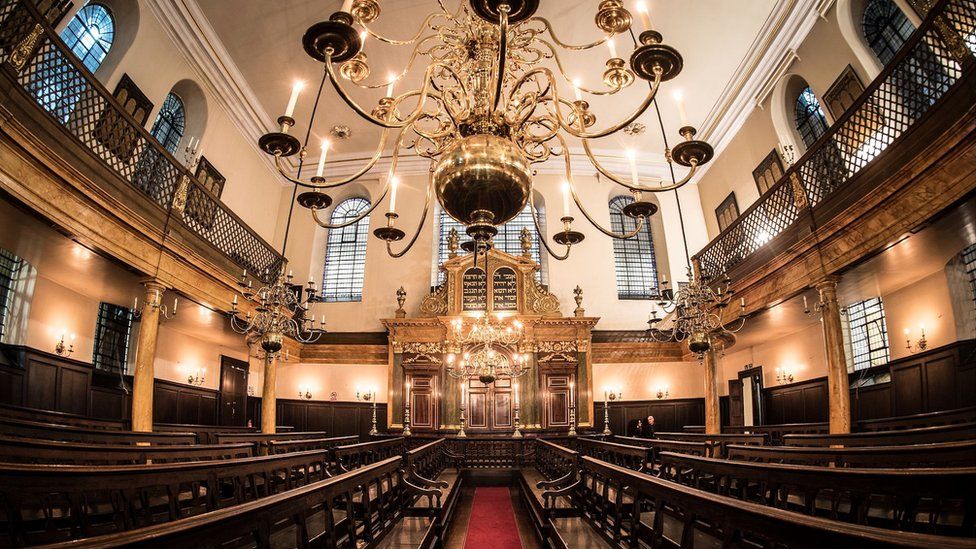Bevis Marks synagogue: Tower block plans spark hundreds of objections
- Published

Hundreds of objections have been filed against plans for a high-rise block next to the UK's oldest synagogue.
Developer Welput's 43-storey proposal for Bury Street in the City of London has been described as "wholly inappropriate" and "an obscenity".
A previous application, for a 48-storey office block, was rejected in 2021. The new plan is also for offices, with space for shops and education.
Welput has said it has developed its plans with the area's history in mind.
The Grade I listed Bevis Marks synagogue relies mainly on daylight and candlelight for worship.
An independent review said the 2021 plans for the tower block would result in "significant reduction in sunlight".
The new planning application shows the building would be slimmer at the top than the one previously suggested, which would allow for more light on the synagogue.
In the space of a month, 298 objections have been filed.
One objector stated: "This kind of proposal would never be considered within the vicinity of St Paul's Cathedral, and should certainly not be permitted just metres from British Jewry's Cathedral synagogue."
Bevis Marks
Bevis Marks is a short section of street in the City of London, just south of Houndsditch.
It was earlier 'Buries marks', a lane forming the boundary (mark) of land belonging to the abbey of Bury St Edmunds. The intrusion of the letter 'v' seems to have come about as the result of transcription errors in medieval manuscripts.
The Grade I listed synagogue, on the borders of the City and the Borough of Tower Hamlets in London, is the Cathedral Synagogue of the Spanish and Portuguese Sephardic Jews.
Finished in 1701, it was the first synagogue to be built following the re-settlement of Jews in England in the second half of the 17th Century.
Its interior and fittings are largely unchanged from the original and reflect the influence of the great Portuguese synagogue of Amsterdam of 1675.
The roof was replaced after a fire in the 18th Century - but neither the London blitz nor a nearby IRA bomb damaged the building.
Rabbi Shalom Morris of Bevis Marks previously described the application as a "grotesque attempt by developers to mislead the British public. They imply that they have satisfied us - which is completely untrue - and they claim a long list of planning benefits, most of which are spurious".
He added: "It is an affront to both the Jewish community and to UK heritage and we are not fooled.
"Incredibly, the City of London is facilitating this hostile proposal by refusing to include policies in their new local plan draft that would protect the synagogue from such vandalism."
A City of London Corporation spokesperson said at the time its draft local plan "contains measures that seek to give effective protection".
The plan also states that developments should "form a positive relationship with the synagogue, without dominating or detracting from its architectural and historic value".
A spokesperson for Welput said: "Our Bury Street project seeks to maximise heritage, environmental and public benefits by considering the future use of the entire site.
"We have a sincere respect for the historic and cultural importance of the area around this site, including Bevis Marks Synagogue, and have developed our proposal with such heritage sites in mind.
"Most notably, we have meaningfully reduced the height of Bury House and articulated the building at the upper floors with additional steps."
Related Topics
- Published5 October 2021
- Published1 September 2021
- Published23 June 2020